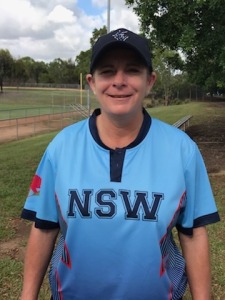Getting the best out of your players! - Kerrie Porter
It should be every coach's desire to provide each athlete with the best opportunity to reach their potential - easy to say, harder to accomplish.

From my experience, every athlete needs to be managed in a way that suits their personality, ability and what they wish to achieve within their sport. Some athletes are playing because they enjoy getting out, competing and having fun with their mates. Some athletes have the ambition to reach the pinnacle of the sport and represent their State and Country.
A good start is to ensure as coaches we provide a safe, positive learning environment every time we have the opportunity to work with athletes. They perform best when they are relaxed, comfortable and confident in their abilities and surroundings.
An important aspect of providing a safe, positive environment is working hard on building relationships and connecting with athletes. To get the best out of athletes they need to feel you have their back, no matter what the outcome and this leads to the trust required to be successful.
Athletes also need to know as the coach you have the knowledge and experience to help them develop their skills to their desired level. Your job as a coach is to get their buy in. Educating yourself on current trends, asking more experienced coaches for their assistance, listening and asking questions are ways to increase your knowledge, so you are confident in your delivery to the athletes.
Training
We have limited opportunity to train with our athletes, so it is important that each session is planned and organised. Athletes need to be challenged, so sessions should contain specific drills on what you are trying to achieve and an explanation of what each drill is teaching them and the desired outcomes.
Teach your athletes what you want them to do, rather than telling them what they are doing wrong. By reinforcing what you are looking for, this creates a positive learning environment which keeps the athlete relaxed and helps the athlete to understand what they are trying to achieve, rather than them thinking about what they are doing wrong.
You also need to understand that different athletes may learn in different ways - some may be able to understand instruction, but you may have visual learners who need to see what you want from a drill rather than just an explanation. Demonstrating and explaining what each drill is and the desired outcomes will cover both visual and those who understand instructions.
Training sessions should be dynamic, exciting and challenging, so the athletes are motivated to work hard on their skills and enjoy their learning environment.
Honesty
From my experience, being upfront and honest with athletes enables you to get the best out of them. They need to know what they need to do to achieve their goals and having robust conversations with them, allowing them to explain what they are thinking and feeling, will help break through any barriers that may be stopping them from reaching their potential. This cannot be achieved unless the athlete feels safe in the environment. Communication should always be two ways, with athletes contributing their experiences also. This may be harder with younger athletes, but they can still tell you what they are thinking and feeling and this in turn lets them know that you care about helping them. Communicating to each athlete what their role is within the team helps them to have a clear understanding of your expectations and this allows the athlete to be clear in their mind of what they are required to do. This helps them to relax and concentrate on their specific role or roles in the team.
Enjoyment
If athletes are enjoying what they are doing, they will normally do it well. Softball is a game with many challenges, but if athletes get enjoyment and can see you as a coach enjoying their successes, then it is fun for all. You should never forget that softball is a game and should be fun.
Respect
Gaining an athlete's respect and respecting them is most important. I have never met an athlete that does not try to do the best they can whenever they train or compete. Softball is a tough sport, with many failures, so each individual athlete needs encouragement and support at all times. You will find over time that athletes respond better if they understand and respect what you are trying to teach them. Positive reinforcement is crucial to gaining respect from athletes.
Summary
There is no one answer to getting the best out of your athletes, but if you provide a safe, positive, learning environment, you will go a long way to ensuring you will. Educating yourself and developing relationships with your athletes will build a solid foundation for successful outcomes. Understanding individuals and how they respond to challenges will help you to gain knowledge on how to motivate them to reach their potential. Ensuring athletes are comfortable with being uncomfortable under pressure, will help each athlete compete to the best of their ability and will help them to contribute to the team goals.












